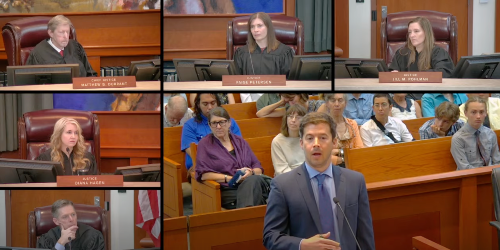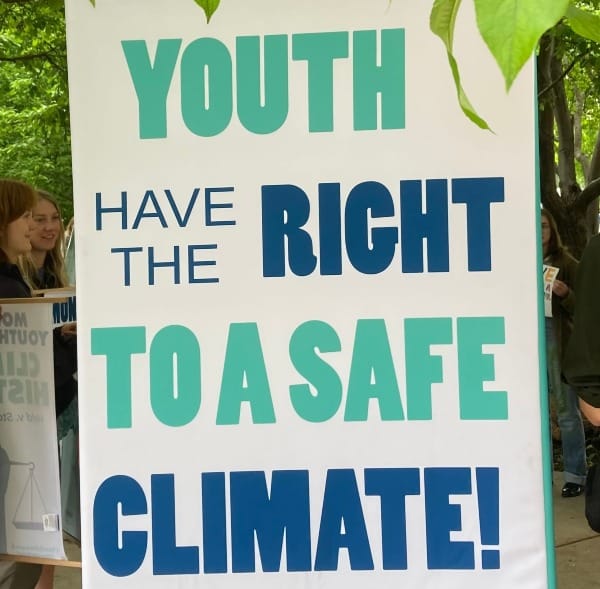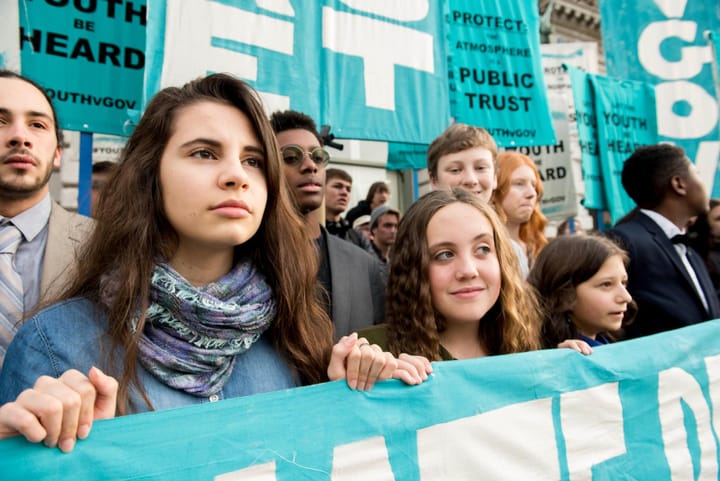Utah Supreme Court Hears Appeal Of Youth Climate Case Challenging State’s Fossil Fuel Energy Policies

A group of seven young people from Utah who sued their state government over policies that promote and perpetuate fossil fuels were back in court on Wednesday as the Utah Supreme Court heard arguments on the youth plaintiffs’ appeal of the case’s dismissal. The case, Natalie R. v. State of Utah, seeks a court declaration that the state’s pro-fossil fuel energy policies violate Utah’s constitution, including the right to life. But whether or not such a declaration could provide meaningful relief is a key question that the court will be considering as it decides if the case should be revived and allowed to proceed to trial.
During the September 4 hearing, Utah Supreme Court justices questioned the youth plaintiffs’ counsel about this issue of redressability, or how a declaratory judgment could help alleviate the alleged harm to the youth without expressly ordering the state to make energy permitting decisions in a particular way. In other words, even if the challenged policies were determined to be unconstitutional, how would that result in a change in the state’s conduct in terms of authorizing fossil fuel development?
As Andrew Welle, senior staff attorney at Our Children’s Trust and co-counsel for the youth plaintiffs, told the court, a declaration of constitutional violation would set boundaries that should guide the state’s regulatory agencies in making sure their fossil fuel permitting decisions do not result in substantially more greenhouse gas emissions that harm the state’s youth. “On a system-wide basis, that would lead to meaningful results and would clarify that permits would need to begin to be denied,” Welle argued. He added that this does not mean that all fossil fuel development in the state will stop overnight, but that it should be in decline as Utah transitions to renewable energy.
“These young people have come to the courts because Utah’s fossil fuel laws are causing serious harms to their personal health and safety and taking years off of their lives,” Welle said in the opening of his argument before the Utah Supreme Court. State defendants, he said, “are responsible for the hazardous air quality and increasingly dangerous climate conditions in Utah from which these youth cannot escape.”
The lawsuit, filed in March 2022, alleges that Utah’s policies and statutes directing the state to promote, foster, encourage and maximize fossil fuel resources result in dangerous levels of climate and air pollution that risk the health and safety of the state’s youth and shorten their lifespans. “Because of the development and combustion of fossil fuels, Utah has the worst average air quality of any state in the nation and is already experiencing profoundly dangerous climate changes,” the complaint states.
In November 2022 the district court decided in favor of the state to dismiss the case. The youth plaintiffs appealed, and the case was taken up by the state’s highest court in move that signaled the importance of the constitutional questions involved.
Erin Middleton, an assistant solicitor general who argued on behalf of the state, told the Utah Supreme Court that a declaratory judgment in favor of the youth would not necessarily change the state’s conduct and would not provide meaningful or substantive relief.
“Any decision about constitutional rights in this case would amount to an advisory opinion,” she argued. “If [the challenged] policies no longer existed, it’s only speculative that the absence of those policies would change the state’s energy decisions at all.” Rather than bring a complaint over “generalized grievances”, Middleton argued that plaintiffs would have to challenge a specific agency decision, such as an individual project permit, for there to be a viable claim.
In his rebuttal, Welle countered that a challenge to an individual permit would not suffice because the harm that plaintiffs experience is the result of systemic government conduct.
“It’s really important to me that this case goes forward so that we’re able to talk about how the state’s fossil fuel policies are causing this damage to our right to life,” youth plaintiff Lydia M. said in a press conference following the hearing.
Natalie R., the named plaintiff on the case, explained what a victory for the youth would mean. “A win in this case would ultimately mean that the state would need to change its decision-making process regarding the fossil fuel industry.”
Welle, speaking at the press conference, said he is pleased with how the hearing went and is optimistic that the youth will get a favorable decision from the state’s Supreme Court. “What we saw in there I think is an indication that allows us to be extremely hopeful that we will get a decision from this court that will put these youths’ claims back on track for trial.”
Other state-level youth constitutional climate cases are currently pending in Alaska, Virginia, and Montana. The Virginia and Montana cases are also before those states’ Supreme Courts, but only the Montana case has been to trial.


